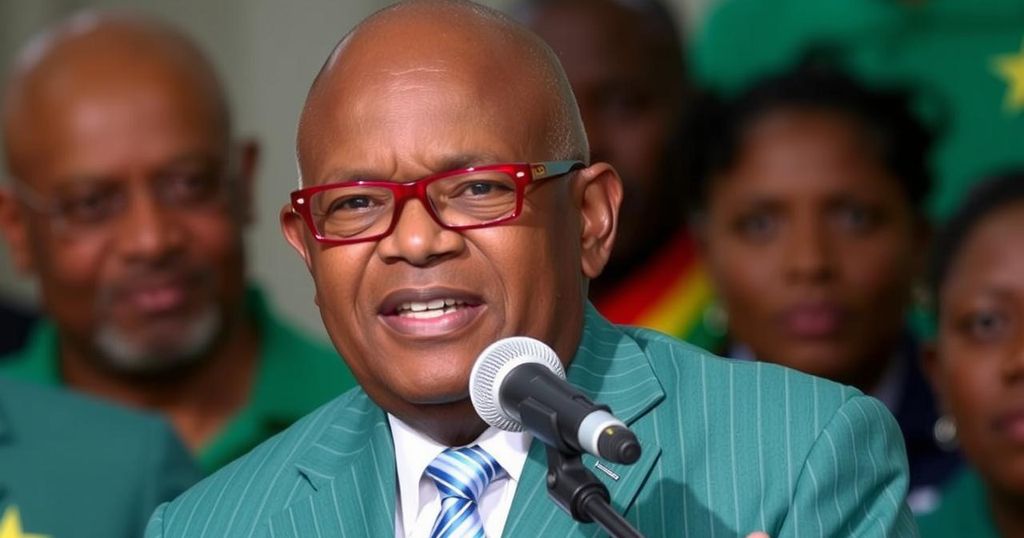Politics
AFRICA, CHA, CONSTITUTIONAL COUNCIL, CORRUPTION, DANIEL CHAPO, DEMOCRACY, ELECTORAL COMMISSION, EUROPE, FRELIMO, GOVERNANCE, JUDITE SIMAO, MAPUTO, MOZAMBIQUE, NACALA - PORTO, OPPOSITION, PLATAFORMA DECIDE, POLITICS, PORTO, PORTUGAL, SOUTH AFRICA, TV SUCESSO MOZ, VENANCIO MONDLANE
Fatima Khan
0 Comments
Mozambique’s Court Confirms Frelimo’s Election Win Amid Protests and Violence
Mozambique’s Constitutional Council confirmed Frelimo’s election victory amid allegations of vote rigging and massive protests. The ruling party’s leader, Daniel Chapo, received approximately 65% of the vote, instigating significant unrest resulting in over 130 deaths. The ongoing civil protests have disrupted foreign business operations and have raised concerns about economic growth for the upcoming year, following criticism from both opposition and international observers.
On Monday, Mozambique’s Constitutional Council validated Frelimo’s triumph in the contentious October elections, inciting extensive opposition protests claiming electoral malpractice. As Frelimo has maintained control since the nation’s independence in 1975, this affirmation is expected to exacerbate tensions in Mozambique, a nation with nearly 35 million inhabitants. Western observers have criticized the election as neither free nor fair, leading to unprecedented civil unrest historically directed at Frelimo, resulting in at least 130 fatalities amid clashes between protesters and police.
The Constitutional Council declared that Daniel Chapo of Frelimo received approximately 65% of the vote—lower than the electoral commission’s previously reported figure exceeding 70%—and attributed fewer parliamentary seats to the party without providing clarification. While Frelimo is consistently accused of electoral fraud, the commission remains silent on these allegations. Chapo subsequently expressed his intent to enhance the quality of life for the people of Mozambique during a Frelimo gathering.
Judite Simao, representing opposition leader Venancio Mondlane, who reportedly secured about 24% of the votes, condemned the results, stating, “We never thought that the electoral truth would be trampled. The will of the people was obliterated.” The unrest has notably disrupted operations for foreign businesses, such as the Australian mining firm South32, and has resulted in the temporary closure of a critical border crossing to South Africa. Furthermore, an official from the International Monetary Fund indicated that Mozambique’s anticipated economic growth for 2024 would likely fall short of a previous estimate of 4.3% due to this unrest and the repercussions of Cyclone Chido.
The political landscape in Mozambique has been predominantly shaped by the ruling Frelimo party since the country gained independence in 1975. Elections have been contested since they were first permitted in 1994, with ongoing accusations of vote rigging and fraudulent practices against Frelimo. The Constitutional Council holds the ultimate authority in electoral decisions, often leading to tensions between the ruling party and opposition groups, particularly in the aftermath of disputed elections. The ongoing unrest poses significant risks to economic stability and foreign investment within Mozambique, as seen in recent protests.
The affirmation of Frelimo’s election victory by the Constitutional Council highlights the deeply rooted tensions in Mozambique’s political system. With widespread protests erupting in response to the perceived electoral fraud, the repercussions extend beyond civil unrest, affecting the nation’s economy and international relations. As parties and civil society continue to contest the validity of the election results, the potential for ongoing instability looms, challenging the country’s future governance and development.
Original Source: www.cnn.com




Post Comment